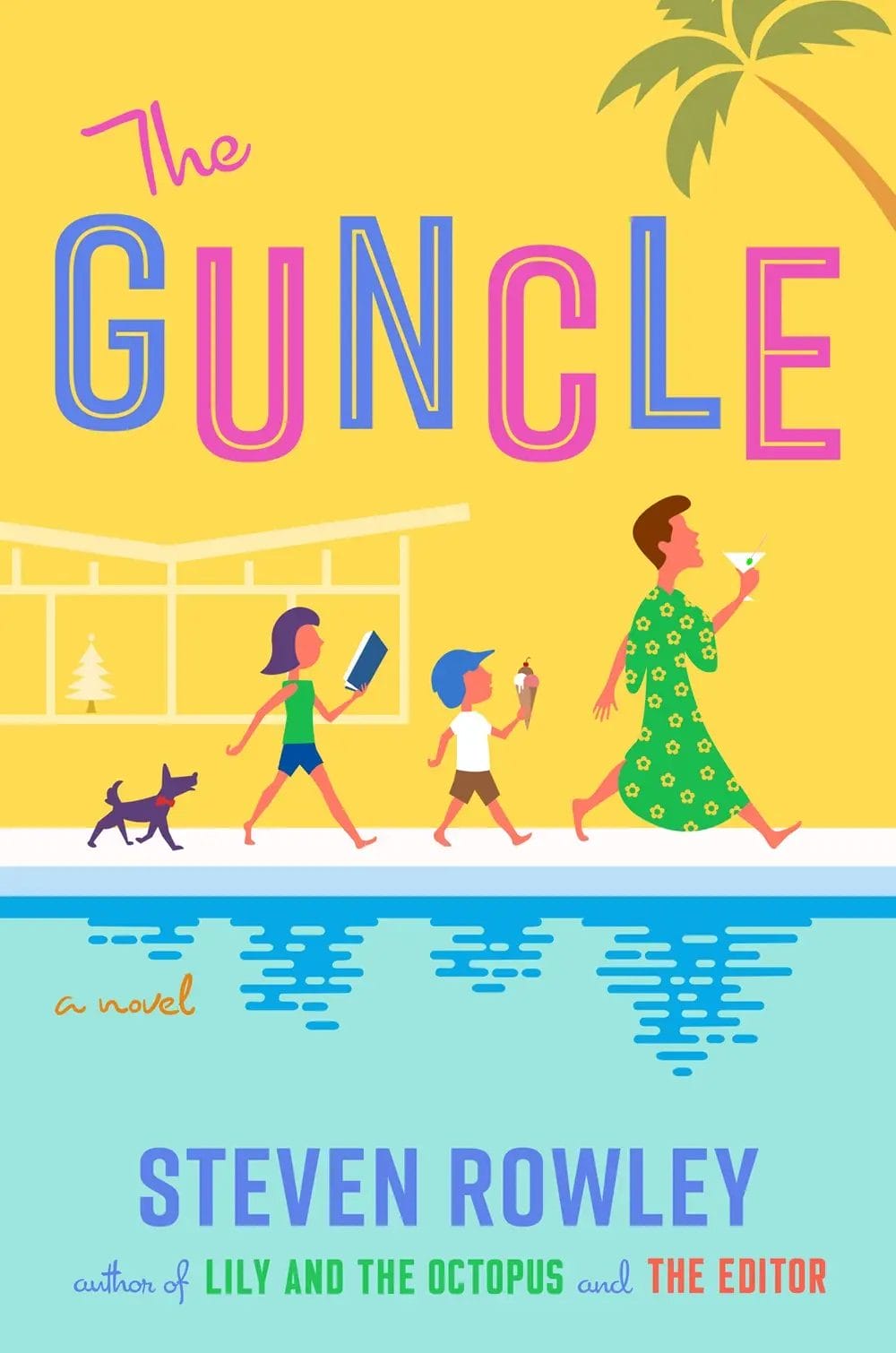

The Guncle
Patrick, or Gay Uncle Patrick (GUP, for short), has always loved his niece, Maisie, and nephew, Grant. That is, he loves spending time with them when they come out to Palm Springs for weeklong visits, or when he heads home to Connecticut for the holidays. But in terms of caretaking and relating to two children, no matter how adorable, Patrick is honestly a bit out of his league.
So when tragedy strikes and Maisie and Grant lose their mother and Patrick’s brother has a health crisis of his own, Patrick finds himself suddenly taking on the role of primary guardian. Despite having a set of “Guncle Rules” ready to go, Patrick has no idea what to expect, having spent years barely holding on after the loss of his great love, a somewhat-stalled career, and a lifestyle not-so-suited to a six- and a nine-year-old. Quickly realizing that parenting—even if temporary—isn’t solved with treats and jokes, Patrick’s eyes are opened to a new sense of responsibility, and the realization that, sometimes, even being larger than life means you’re unfailingly human.
My thoughts:
This book was really sweet! I went into it expecting something light and fluffy – which it was, in a sense, but it was also pretty emotional.
Gay Uncle Patrick (or GUP as his niece and nephew refer to him) is somewhat of a recluse. For years he was a star on a popular TV sitcom known as The People Upstairs, which to me seemed it would be like Friends, and Patricks’ character had the series catchphrase (kind of like Joey’s “How you doin?” on Friends) and people still say it to him whenever they meet him.
Four years after the series went off the air, Patrick lives alone in Palm Springs. He lost the love of his life in an automobile accident and has stopped acting. When his best friend Sara (who also happened to be his brother’s wife) dies after a battle with cancer, Patrick’s brother admits that the stress of Sara’ illness turned him into a pill popper and he needs to go to rehab. The place he has chosen is in California – far from his home in Connecticut, but near Patrick. Because of this, he would like Patrick to care for his two children (Patrick’s niece and nephew) nine-year-old Maisie and six-year-old Grant.
Patrick adores his niece and nephew, but he in no way feels like he could ever be responsible for two children, 24-hours a day, for three months straight. I completely understood this. I don’t have kids of my own, nor have I ever wanted them. I am fine with kids I know – I have two goddaughters and several nieces and nephews and hanging with them for an hour or two while their parents went out was always fun, but I would not want to be responsible for them 24/7 for even a couple of days, let alone three months. I couldn’t do it. He finds every excuse not to, but his brother insists, and when his cold sister offers to take the kids instead, insinuating that Patrick wouldn’t be able to handle it, he decides he’s going to prove her wrong, and whisks Maisie and Grant off to California.
Patrick is definitely in over his head. His daily routine doesn’t at all match what Maisie and Grant are used to, but as time goes on and Patrick lays down his Guncle rules, the three eventually find their rhythm. As the days pass Patrick is able to help the kids deal with their grief, and he, too, is able to deal with not only the loss of his best friend but also the grief he still carries with him over the loss of his partner.
Other notable elements of the book include the “throuple” next door known as JED (John, Eduardo and Dwayne), a remote-control bidet that endlessly entertains the kids, trying to find the perfect tooth fairy gift, and a fabulous Christmas in July party. We’re also presented with several “Guncle” rules. One that made me laugh out loud was Guncle rule #5: If a gay man hands you his phone, look only at what he’s showing you. If it’s a photo, don’t swipe. And for God’s sake, don’t open any unfamiliar apps.
And my other favorite, Guncle rule #7: In this house we wear what we want, it doesn’t matter if it’s for boys or girls. Anything goes, anything you want, so long as it doesn’t have mean words printed on it and it’s not making fun of anyone else. We don’t worry about what others think.
Every one of the characters – even those we only see a few times – are fully fleshed out. I fully related to Patrick. I mean, I’ve never been on TV or famous in any way, shape or form, but his relationship with his family and even with himself was fully relatable. In chapter three of the book, he’s reflecting on his relationship with his family when he runs into his sister at Sara’s funeral. His sister says, “It’s fun to see you back in Connecticut. I thought you were done with us.” To which he replies, “Planes fly west, you know.” The passage continues with: It was an old argument. When Patrick moved to Los Angeles, he flew home regularly for years, every six months or so until he stopped. It was the show, it was his schedule. Everyone assumed fame had changed him. And, to some extent, it had. It gave him the confidence to call out hypocrisy when he saw it. He came home, no one came to see him. After a while he began to wonder: What was the point?
That 100% sums up my life. I lived in Houston for 17 years and my parents didn’t once come visit me. I moved back to Oregon eight years ago, but no one in my family has bothered to drive up to visit me, but if I so much as go on a vacation to anywhere but to Idaho to visit them, I am the worst person in the world. It’s exhausting.
The only element in the book that I found lacking was the character of Emory – a young actor that Patrick has a fling with. He didn’t really further the plot, nor did he add much to the story, and I felt they could have cut him and the story would have been fine. On the other hand, it wasn’t enough to ruin anything.
The ending is bittersweet, as one would expect, but it ended the way the book needed to. It is a great look at struggles of single, gay men, grief and healing.
Genre(s):
Other Bookish Tags:
Series Info:













